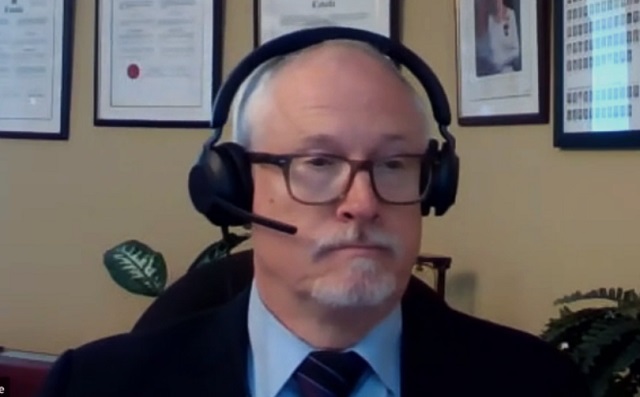Economy
Natural gas key to withstanding winter and Ottawa’s assault

From the Fraser Institute
Mother Nature has reminded everyone that the stakes in the battle to preserve and expand Alberta’s natural gas power production are very high—basically, life or death.
Last week’s polar vortex drove temperatures into record negative territory across western Canada. Nighttime temperatures in Alberta, for example, reached -51 degrees Celsius at Keg River. Without sufficient power for running the heat on high, these are killing temperatures. Demand for electricity in Alberta soared, pushing the power grid toward potential need for rolling blackouts. Only voluntary cutbacks in electricity use by Albertans allowed the system to avoid curtailment.
What did the grid look like last week?
On Jan. 13, according to one report, natural gas generated 80.5 per cent of power on Alberta’s grid followed by coal (7.9 per cent), biomass (2.9 per cent), hydropower (2.5 per cent), solar power (1.3 per cent) and wind (0.99 per cent). But wind and solar’s low combined output was not the major cause of Alberta’s energy crunch last week—two of Alberta’s natural gas power plants were down for maintenance and not generating what they otherwise would have.
And yet, while gas and coal combined produced nearly 90 per cent of Alberta’s life-saving electricity, these fuels remain in the crosshairs of Ottawa and the Trudeau government’s proposal that greenhouse gas (GHG) emissions from electricity production in Canada must decline to “net zero” by 2035.
In the battle over the Trudeau government’s plan, Alberta Premier Danielle Smith argues that Ottawa intends to shut down natural-gas power generation, and because alternatives such as wind and solar power are unaffordable, Alberta will be unable to generate sufficient electricity for Albertans. Meanwhile, federal Environment Minister Steven Guilbeault denies that Ottawa wants to end fossil fuel use and argues that his government’s proposed regulations already allow for natural gas power production, so long as GHG emissions are “mitigated” via carbon capture and storage. Even unmitigated natural gas power would be allowed in emergency situations, according to Guilbeault, who recently accused Premier Smith of “trying to tear Canada down.”
Guilbeault’s argument, however, rests on what he likely knows is a false hope—that carbon capture and storage technology will evolve and be deployed at sufficient speed and capacity to allow Alberta to attain the net-zero emission target by 2035. This is highly unlikely. Carbon capture and storage has many critics including the International Energy Agency (IEA), which recently published a report suggesting that carbon capture and storage is inadequate for capturing carbon dioxide at the scale necessary to reach net-zero emissions by 2035 or beyond. Fatih Birol, executive director of the IEA, threw cold water on the idea, saying the oil and gas industry must help the “world meet its energy needs and climate goals—which means letting go of the illusion that implausibly large amounts of carbon capture are the solution.”
The potential peril of power outages during a polar vortex shows the importance of ensuring that Alberta has a reliable dispatchable electrical generation capacity able to meet even extreme demand. Wind and solar power, favoured under the Trudeau government’s proposed clean electricity regulations, can’t supply that. Premier Smith is right to bank on natural gas generation for Alberta’s future, and she should stand fast. As remaining coal power plants are closed, natural gas will be the foundation of Alberta’s energy stability and it must be defended.
Author:
Automotive
Forget Tariffs: Biden Should Look to Domestic Mining to Thwart Chinese EVs

Fr0m Heartland Daily News
By Rick Whitbeck
The Biden administration’s decision to raise tariffs on Chinese-manufactured electric vehicles, steel, computer chips, and other technological products is the epitome of a penny wise and a pound foolish.
To much of the nation, the news was a reelection flip-flop, or an attempt to prop up the electric vehicle industry Biden has prioritized since he took office, as part of his green agenda. The international supply chain for electric vehicles isn’t going to magically stop running through the Chinese Communist Party anytime soon.
If Biden really wanted to curb Chinese geopolitical power, he would make fundamental changes to his administration’s history of attacking domestic mining opportunities. Allowing development of copper, graphite, nickel, cobalt, and other critical and strategic minerals right here at home would go much further than imposing tariffs.
Biden has demonstrated affinity for promoting “net zero” policies and forcing transitions away from traditional energy supplies of oil, gas, and coal. In a nutshell, the attacks on domestic mining projects seem completely counterproductive.
According to the International Energy Agency, staggering quantities of subsurface elements will need to be mined by at least five times their current worldwide production by 2040 to meet the Biden administration’s green energy goals. Graphite, cobalt, and lithium all will be needed in quantities exceeding 25 times (or more) their current supplies. In the next quarter century, we will need twice as much copper than has been produced in the last 3,000 years. All of which is impossible when Biden won’t let us dig.
The U.S. has tremendous opportunities to have our own mineral resources. Yet, the Biden administration has thwarted their development at nearly every turn. For example, massive copper and nickel deposits could be developed in Minnesota at the Twin Metals and Duluth Complex projects, but Biden has ordered each of them off-limits for development. The Resolution Copper prospect in Arizona met a similar fate, with the Department of Interior placing on “indefinite hold” its approval.
The Western Hemisphere’s largest copper prospect is Alaska’s Pebble Mine. Kowtowing to environmental extremists—and ignoring a clean U.S. Army Corps of Engineers’ Final Environmental Impact Statement—the Environmental Protection Agency continues to stymie progress on a deposit worth more than $500 billion. All the while shutting down the possibility of 700 full-time jobs in an area of rural Alaska that has seasonal unemployment exceeding 20%.
Alaska has been the target of more than 60 administrative and executive orders targeting its resource-based economy since Biden assumed office. One of the most recent took place on Earth Day, when a congressionally-authorized road to the Ambler Mining District—an area rich in copper, zinc, and other strategic and critical minerals—was stopped by the Department of Interior.
Just like with the Resolution mine in Arizona, the Interior Department used “Indigenous opposition” as its deciding factor, even though many villages and tribes closest to the mining district publicly support the project and its future employment opportunities. In Alaska, the Biden administration literally blocks the road to the minerals Biden’s tariffs claim to protect.
Alaska’s governor, Michael Dunleavy, along with its entire congressional delegation, has been openly critical of the continued hypocrisy of the Biden administration when it comes to talking “net zero” and acting with vigor to oppose domestic mining projects. The same response has come from many within the Minnesota and Arizona congressional community. They’ve been unable to break through to the administration, as Team Biden chooses to listen to eco-activists and career bureaucrats with an anti-development agenda.
What would hurt China, empower America, and begin to chip away at the global imbalance would be mining and processing our crucial minerals and elements domestically. Let’s see if the Biden administration wises up to that fact, or if America tires of being subservient to the CCP and makes fundamental changes to federal leadership in November.
Rick Whitbeck is the Alaska State Director for Power The Future, a national nonprofit organization that advocates for American energy jobs and fights back against economy-killing and family-destroying environmental extremism. Contact him at [email protected] and follow him on X (formerly Twitter) @PTFAlaska
This article was originally published by RealClearEnergy and made available via RealClearWire.
To read more about domestic mining to escape reliance on China, click here.
To read more about clean energy and mining, click here.
Economy
Oil Lobby Working With Republicans Behind-The-Scenes To Push ‘Gateway’ To Carbon Tax

 From the Daily Caller News Foundation
From the Daily Caller News Foundation
By NICK POPE
America’s leading oil and gas trade group is working behind the scenes with moderate House Republicans to push support for a bill that critics say could lead to a domestic carbon tax, according to an email obtained by the Daily Caller News Foundation and sources familiar with the matter.
On May 14, Chris Boness, the director of federal relations for the American Petroleum Institute (API), sent an email to an API mailing list that named several House lawmakers intending to co-sponsor the PROVE IT Act alongside Republican Utah Rep. John Curtis. The trade group has also met with staffers to try to secure support for the bill, which API supports, according to sources familiar with the matter.
Assuming the House version is the same as the already-introduced Senate version, the bill would instruct the Department of Energy (DOE) to study the carbon intensity of goods — including aluminum, steel, plastic and crude oil — produced in the U.S. and the carbon intensity of products from other countries, according to E&E News.
Dozens of the PROVE IT Act’s critics have described the bill as a possible “gateway” to domestic carbon taxes because it would effectively instruct the federal government to calculate an implicit cost of carbon with few restrictions on how that official metric is used in the future.
“Thanks for those that joined today’s meeting,” Boness wrote in the email obtained by the DCNF. “Here is the list of current [Republican] cosponsors of the PROVE IT Act: Curtis, [Michigan Rep. Tim] Walburg (sic), [Ohio Rep. Bob] Latta, [New York Rep. Andrew] Garbarino, [Florida Rep. Maria Elvira] Salazar, [Michigan Rep. Mariannette] Miller-Meeks, [Indiana Rep. Larry] Bucshon, [Oregon Rep. Lori] Chavez-DeRemer. Additionally, [Georgia Rep. Buddy] Carter, [New York Rep. Mike] Lawler and [Pennsylvania Rep. Dan] Meuser seemed interested. Will keep you updated if others join and send updates on introduction.”
API representatives have had meetings addressing the PROVE IT Act with lawmakers’ offices, sources familiar with the matter told the DCNF. The offices of Curtis, Walberg, Latta, Garbarino, Salazar, Miller-Meeks, Bucshon and Chavez-DeRemer did not respond to questions about why they apparently support the bill.
Carbon pricing is broadly unpopular with Republicans, according to E&E News. Generally, polling indicates that Republicans do not consider climate change to be a problem in need of major government-led solutions and that energy affordability, for example, is a much stronger concern.
API Email re: PROVE IT Act by Nick Pope on Scribd

The bill’s proponents tout it as a measure to reward American companies for producing products more cleanly than foreign competitors, but opponents are strongly concerned that the bill instructs the federal government to effectively set a price on carbon with insufficient restrictions what the government can do in the future.
Notably, Republican West Virginia Sen. Shelley Moore Capito introduced an amendment to the Senate version that would prevent the data collected from being used as the basis for carbon taxes or tariffs, but Democrats killed that proposal while the bill sat in the Senate Environment and Public Works Committee.
Despite concerns from those opposed to the bill that it could be a first step to carbon taxes or tariffs, API supports the PROVE IT Act. Notably, API is in favor of carbon pricing.
“America’s oil and natural gas is produced under some of the highest environmental standards in the world,” a spokesperson for API told the DCNF. “Efforts like the PROVE IT Act are bipartisan opportunities to help study and quantify that advantage and demonstrate our industry’s commitment to producing cleaner, safer, and more affordable energy here at home while still supplying the energy our world needs.”
Some of the lawmakers API suggested could be interested in co-sponsoring the PROVE IT Act are wary, however.
Rep. Meuser, whose district includes energy-rich parts of Pennsylvania, is opposed to the bill as it stands, despite API’s suggestion that he is potentially interested in supporting it, a source familiar with Meuser’s thinking told the DCNF.
Rep. Carter is skeptical of policies that could lead to a carbon tax.
“Mr. Carter is reviewing the legislation,” a spokesperson for Carter told the DCNF. “He is absolutely opposed to anything that could lead to a carbon tax.”
In the eyes of those opposed to the bill, the PROVE IT Act would make it easier for a second-term Biden administration to pursue carbon taxes or tariffs that would hurt American consumers and certain types of energy producers.
“Our opposition to the PROVE IT Act is clear and concise. The latest attempt by some in Congress who are trying to create a structure that would lead to a domestic carbon tax will have price implications on our energy, particularly our fuel,” Tom Pyle, president of the American Energy Alliance, told the DCNF. “I do think that it is important to recognize that John Podesta made it clear that this is a second term agenda item for the Biden administration. And why would any Republican want to be the lead on helping President Biden further his war on affordable energy?”
Mike McKenna, a GOP strategist with extensive experience in the energy sector, expressed a similar view.
“The big problem with the bill is that it creates infrastructure to impose a carbon dioxide tax,” McKenna told the DCNF. “As everyone who has had more than ten seconds of exposure to the federal government knows, once that infrastructure can be put in place, it’s going to be used.”
-

 Automotive1 day ago
Automotive1 day agoForget Tariffs: Biden Should Look to Domestic Mining to Thwart Chinese EVs
-

 MacDonald Laurier Institute2 days ago
MacDonald Laurier Institute2 days agoToronto’s “Sankofa Square” – The terrible folly and historic injustice of erasing the legacy of abolitionist Henry Dundas
-

 Fraser Institute2 days ago
Fraser Institute2 days agoFederal government should have taken own advice about debt accumulation
-

 Media2 days ago
Media2 days agoTrudeau’s Online News Act has crushed hundreds of local Canadian news outlets: study
-

 Great Reset1 day ago
Great Reset1 day agoCanadian MP warns new WHO pandemic treaty may enshrine COVID-era freedom restrictions
-

 Economy1 day ago
Economy1 day agoOil Lobby Working With Republicans Behind-The-Scenes To Push ‘Gateway’ To Carbon Tax
-

 Frontier Centre for Public Policy15 hours ago
Frontier Centre for Public Policy15 hours agoThey spent $8,000,000 without putting one shovel in the ground
-

 Agriculture22 hours ago
Agriculture22 hours agoResearch Suggests Cattle Raising May Reduce Emissions





